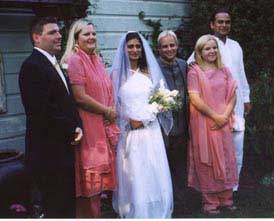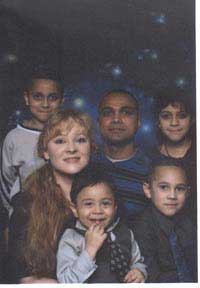Life
Till Marriage Do Them Part

Intercultural unions frequently spark family divisions.
|
Rahul Kohli* and Sultana Iqbal* still remember the day they bought their new house in Houston, Texas. It was a day of rejoicing, but what they battled instead was a tense graih-pravesh ceremony, the traditional Indian housewarming. Even though the new house was only a block from his parents’ house, Sultana was accused of trying to “steal” Rahul from his family.
The root of the problem? Rahul married his college sweetheart, who happened to be Muslim. “Marrying Sultana was the biggest battle of my life,” Rahul says, adding that his parents felt completely let down by his choice. Until the day of the move, he was receiving hysterical phone calls from relatives back in India, imploring him not to leave his parents! Sultana says the constant judging she had to put up with in her in-laws’ house got too much for her independent, secular self. “Consider a puja or a party my mother-in-law threw. People would point in my direction, ask which dish I cooked and not eat that, or just be a little vary when I was around.” Speaking about Muslims in particular, he says according to them, anyone who doesn’t worship Allah is a “Kafir.” Hence, will they ever see a Kafir daughter-in-law as an equal in their household? And, he demands, if they are allowed to have up to four wives, is that fair for a Hindu girl? Mona Rashid, a Pakistani American in the anthropology department of the University of Washington in Seattle, begs to differ. Islam has been a victim of misinterpretation, she says, adding that there is no caste system in Islam. All people are equal in Islam, unlike Hinduism, which is still struggling with caste and dowry problems. Also, she says, that religion often becomes a tool of power. When people move to a new country, they are often victims of the “icebox effect,” i.e. “freezing their perceptions of their home country at the time they last saw it.” Combined with the challenges of their new life, people frantically try to find a middle ground. But if they experience a decline in their lifestyle, financially or socially, they feel they can always fall back on religion, falling prey to fanatical religious zealots. Rashid says growing up poor in Berkeley, she saw the hold of maulvis on the blue collar society where a woman’s worth is still measured by how many sons you have birthed. Rashid rebelled, went to school, married a Caucasian man and says she has since been disowned by her family for shaming the family name. Rashid says women like her are always made to feel guilty for wanting to go to school and desiring financial independence. They are torn between the parallel universes of contemporary America and the traditional society they come home to at the end of the day. She questions the wisdom of living with abusive husbands, alcoholics, violent men, womanizers and drug abusers just because they are from the same community over living with a caring, responsible partner who happens to be from another race. Rashid says children who are made to feel like unwelcome burden by the mainstream society, like the kids at Columbine who murdered their school mates, remain misfits in spite of growing up in America. They, especially the men, experiment with such taboos as drugs, alcohol and sex, but want to marry some “bholi-bhali” girl from the backwaters.
Mary Lynn Nair of Bellingham, Wash, says four children and a decade since her marriage to her Fiji Indian husband Mahendran Nair, she still encounters the occasional relative who seeks to persuade her to follow their family guru. Mary Lynn says that when Mehandran told his family he wanted to marry a Caucasian girl with an evangelical background, the world came crashing down on him. His family held a conference where it was made clear that he was simply not supposed to marry a non-Indian. His mother also told him that he would be disowned if he didn’t follow the family. When Mehandran stood his ground and the parents saw he was adamant, they agreed to try to develop a working relationship with the couple. Mary Lynn says it’s been hard fitting in because you don’t know which faux pas might upset some older, traditional in-law. Nevertheless, she commends the Nair family for making a genuine effort of making their relationship work. The elder Kohlis (Houston-based) too, in their defense, say they had to sever relations with many long standing friends, because they would simply not accept a Muslim influence in their social circle. “In the end, we wanted Rahul to be happy and we agreed to the match, but I would want my grandchildren to be Hindu for sure,” says Mrs Kohli. Hence, Sultana and Rahul hunt for names that do not sound too religious and celebrate Diwali and Eid equally. The Nairs have selected names from Hindu mythology for their four children, which is acceptable to Mary Lynn as she follows Sahaja Yoga, which she says, is a method of meditation where all the religious deities and incarnations till date, from Christ to Ganesha, Socrates, Buddha and Mahavira are given equal importance. Nair says religion should not be a question of following a theory according to what family you were born into, but living it. Nipa Shah of Chicago, Ill., married her Jewish boyfriend to the chagrin of her Gujarati family. She says she was so tired of being trapped in her Indian American identity that her escape was Spanish culture. She says parents tend to have an exaggerated sense of importance in their children’s lives and are unnecessarily meddlesome, like Raymond’s mom in the sitcom “Everybody loves Raymond.” Nevertheless, inter cultural alliances have their share of faux pas. For example, Shah had her wedding invitations printed in India to save money. When the packet arrived, out popped these traditional Bandhni cards, liberally sprinkled with swastikas!
The cards went to nearly 100 Jewish relatives and friends, who as it turned out, were incredibly tactful and gracious about it. But, she says the stifling emphasis on marriage in the South Asian communities is alienating the younger generation, forcing them to explore other avenues, like live-in relationships. Farah Nousheen of Seattle, says as the eldest child, she was expected to go to school, find a job and get married pretty much before she turned 25. Instead, she’s an opinionated filmmaker at age 25 and in no rush to settle down yet. She says when she finds a man she wants to spend the rest of her life with, she’ll not let marriage spoil it and claims her mother is fine with that decision. Nagendra Bangalore and Devanshi Patel of Lynnwood, Wash., have been married for two years now. He comes from a staunch South Indian Brahmin family while she is a Gujarati raised in Kuwait. Their parents are still based in India and Kuwait. Nagendra was the first ever in his family to marry a non-Brahmin in generations. He says learning about other cultures made it an easy transition into married life. Both say Indian society is much more progressive now. “People are more open to each other, social and educational status are fast replacing caste and religious differences,” Nagendra says. It’s amazing what the stomach can do for the heart. *The names of Rahul Kohli and Sultana Iqbal have been altered upon request. |



